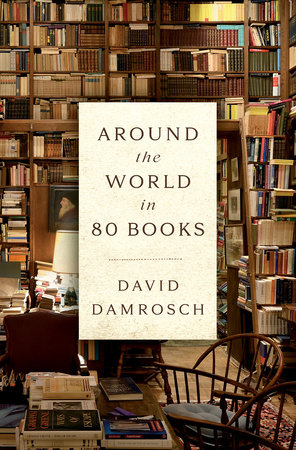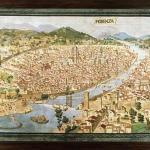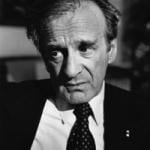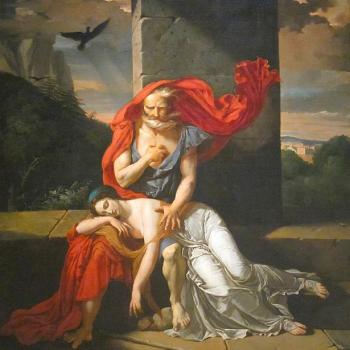Since my earliest memories, my life has been defined by books. I have always loved reading widely, and have especially enjoyed fiction, preferably of the variety that has had a chance to age a couple of millennia. My main major in college was Classics (Greek and Latin languages, literature, and history), but I added a second major in French literature, just because I loved having an excuse to read an extra novel or so each week.

Fast-forward two decades, and I have steadily continued reading somewhere between fifty and eighty new books per year (not counting re-reading a lot of the Greco-Roman Classics each year). The exception was the year my middle child was born: he was a slow eater, so I spent what seems like all day, every day, sitting in an armchair, feeding the baby and reading. As a result, I’m pretty sure I exceeded one hundred books that year. Still, I realized about a year ago that while I was reading a lot in my field, broadly defined, I was feeling intellectually siloed. I resolved to read more broadly, deliberately going outside my comfort zone of the Classics and military history.
And so, as I look back over 2022, this has been a year of (to borrow a term from Karen Swallow Prior, who herself borrowed it from Milton) “reading promiscuously” – rich and encouraging reading that has taught me much in terms of substance but has also given me the opportunity to enjoy writers and topics that were, in many cases, new to me. The result has been a year of both spiritual and intellectual encouragement and, I believe, growth. After all, to quote KSP again, spiritual growth, in particular, should too be the fruit of reading: “it is not enough to read widely. One must also read well. One must read virtuously.” This can apply just as much to reading non-fiction as fiction.
And so, in no particular order, but grouped by topic or general category, here are a couple dozen books that in my completely subjective opinion were the best of the best of my year. Most are beautiful books, when it comes to their content, message, and writing. They are also, in many cases, books that pushed me to reflect further on something that perhaps I had not considered before. In all cases, these are books that told stories and made arguments that intrigued me, even if I did not fully agree with them at the end.
Books about reading
It seems appropriate to start this list with two books that are wonderful books about reading:
Karen Swallow Prior, On Reading Well: Finding the Good Life through Great Books
David Damrosch, Around the World in 80 Books
Those of us who read a lot may think that we know how to read thoughtfully and well already. But these two books show intriguing ways for us to draw connections between readings that might not seem connected, and also provide two distinct frameworks for reading. Karen Swallow Prior’s book, in particular, makes the argument that reading with the gospel in mind can make one grow in particular virtues through reading literature that exemplifies the presence or lack of the necessary virtues for living a good life.

David Damrosch’s book takes a different approach. Inspired by Jules Verne’s classic, Damrosch takes his readers on the same path as the one originally followed by Phileas Fogg, presenting segments of five books from each general region involved. It is a fantastic book to read if one would like to think about familiar books in a new way, but also a great resource for getting suggestions for new classics to explore.

And while Damrosch’s approach is more secular, the spiritual dimension of reading comes across strongly in his book, albeit not in a specifically Christian vein. Overall, though, both Damrosch and Swallow Prior would agree that reading is good for the soul. Tired? Overwhelmed? Angry at something about this world that you cannot entirely pinpoint? Read a book.
Spiritually and intellectually provoking books
Speaking of more spiritually oriented reads, my favorite theological read of the year was Kelly Kapic’s Embodied Pain: A Theological Meditation on Pain and Suffering.
Two fantastic books I enjoyed by historians who bring theology to bear on history were:
Tracy McKenzie, We the Fallen People: The Founders and the Future of American Democracy. Tracy was the President of the Conference of Faith and History when I had first joined the organization, and I have followed his work ever since. In fact, his book on Thanksgiving have been my go-to for graduation presents for Christian students and friends with an interest in history for years. Now I have another option for gifting.
Ansley Quiros, God with Us: Lived Theology and the Freedom Struggle in Americus, Georgia, 1942-1976. I am so excited that Ansley has recently joined the Anxious Bench as well! You can find all of her posts so far here.
Books about women and motherhood
Agnes Howard, Showing: What Pregnancy Tells Us about Being Human – If you only read one book about the history of pregnancy and attitudes towards it, make it this one. It is this good. Seriously.

Tiya Miles, All that She Carried: The Story of Ashley’s Sack, A Black Family Keepsake – This is a heartbreaking and beautifully written book about an enslaved mother who, as her daughter was about to be sold away from her, filled a sack for her with a few objects. The grand-daughter of the little girl, Ashley, eventually embroidered the family’s story on the sack, which is now in the International Museum of African American History in Charleston. Miles is an exquisite story-teller. I cried. A lot. In fact, I don’t think it is possible to read this book without crying.
I am currently finishing up Erika Bachiochi’s fantastic book, The Rights of Women: Reclaiming a Lost Vision, and will be writing a response to it for Current in the new year. Bachiochi is part of a fantastic group of scholars right now who are presenting (or, as Bachiochi reminds, recovering!) a thoughtful vision of Christian feminism. Hint: you can be pro-life and be a thoughtful Christian and maybe even complementarian, and be a feminist too. But it might look different than what the label implies most often.
Wendell Berry is a category of his own
I have heard about Wendell Berry for years, but with all due respect to the Kentucky-based writer, farmer, and activist, his work just didn’t sound like it would be relevant to me, a historian of Ancient Greece and Rome. But hearing his work mentioned so frequently, it was starting to seem like I was missing essential parts of conversations with others in my circle simply through lack of familiarity with any of his work. If so many people I know and respect are reading him, I reasoned, I should at least read something of his to better understand my intellectual community. And so, I asked a friend for some recommendations, and immediately upon reading What Are People For?, I realized just how wrong I had been to dismiss him unread before.
Since then, I have also read his newest book, The Need to Be Whole: Patriotism and the History of Prejudice, and it will keep me thinking for a long while.
Memoirs
Memoirs I enjoyed this year, each of them emotionally hard-hitting in its own way:
Amos Oz, A Tale of Love and Darkness – Had my Jewish family left Russia earlier, many aspects of the story he tells could have been theirs.
Sari Nusseibeh, Once Upon a Country: A Palestinian Life – a wonderful pairing with Oz’s memoir, as Nusseibeh is Oz’s younger contemporary, and the two men knew and appreciated each other.
Nadezhda Mandelstam, Hope Against Hope – I was familiar with the poetry of her husband, Osip Mandelstam, but it was John Wilson — the ultimate source of information about all books, past, present, and future (or so it seems sometimes) — who recommended Nadezhda Mandelstam’s tragic memoir. I was excited to get my hands on a copy in Russian, so this was the one book I read in Russian this year.
Annie Dillard, An American Childhood – melancholy, erudite, truly lovely.
Reading on Eastern Europe
I was born in the Soviet Union and lived there for the first almost ten years of my life. But reading about Eastern Europe this year had a special and mournful significance. The following books served as powerful reminders of the deep historical roots of Russia’s relationship with Ukraine:
Marci Shore, The Ukrainian Night: An Intimate History of Revolution. Shore is one of my absolute favorite historians writing today. Her writing is powerful, and she tells difficult stories with grace and compassion.
I do not normally read YA fiction, but I thoroughly enjoyed (and highly recommend) Amanda McCrina’s two historical novels on Ukraine and Poland in WWII – Traitor and The Silent Unseen. It’s a small world – Amanda is an alumna of the History program at UWG, where my husband and I teach. She is a gifted historian and a beautiful story-teller. These skills come together wonderfully in her books.
Finally, I am reading this month Boris Dralyuk’s gorgeous poetry collection My Hollywood. As a Russian and Ukrainian Jewish immigrant who settled on the East Coast, I am fascinated with Dralyuk’s writing, which offers a tantalizing glimpse into the parallel lives of my compatriots who ended up on the West Coast instead.
Ethics of archaeology and material culture
I taught a class this fall called “Indiana Jones: Excavating Antiquity,” and used it as an excuse to read loads of great books on the ethics of archaeology and material culture. Particularly enjoyable both to me and to my students were:
Roger Atwood, Stealing History: Tomb Raiders, Smugglers, and the Looting of the Ancient World – a supremely well researched but horrifying work of investigative journalism on the illegal antiquities trade in Peru.
Peter Watson and Cecilia Todeschini, The Medici Conspiracy: The Illicit Journey of Looted Antiquities—From Italy’s Tomb Raiders to the World’s Greatest Museums. Several students have told me that after reading this book, they cannot go into a museum in the same way as before. They now read labels. They look at the provenance of each artifact, and whether it has a clear one. So many artifacts even in the most famous museums don’t.
Douglas Preston, The Lost City of the Monkey God – This book has it all: a fantastic adventure, horrifying encounters with apocalyptic poisonous snakes in the jungle, and a spectacular archaeological discovery that combines the use of cutting-edge modern lidar technology with the wisdom of seasoned researchers.
Books about the history and archaeology of Israel
In the summer term, I taught a class, “Jerusalem: 3,000 Years,” which gave me an excuse to read more on Israeli history and archaeology. I wrote about the reading list for this class here. There is a theme here. One of my colleagues has joked before that we could all simply title our classes “Books I’d Like to Read.” It’s true.
Great books by great friends
Chad Davidson, Terra Cognita: Dispatches from an Over-Traveled Italy – this is a delightful work of travel creative non-fiction by a colleague of mine at UWG, whom I previously knew as a gifted poet. He has been traveling to Italy for well over two decades, and bravely taking students there every summer. So, this book presents his reflections on the expected and the unexpected that he has been finding in his experiences of going back to Italy year after year after year.
Eric Miller, Hope in a Scattering Time: A Life of Christopher Lasch – an insightful and beautifully told intellectual biography of a spiritually, socially, and politically conflicted academic misfit. I knew nothing about Lasch before I read it (remember, I’m a Classicist!), but found the book utterly absorbing, and found useful takeaways for thinking more generally about academia and the power of ideas in shaping our lives.
John D. Wilsey, God’s Cold Warrior: The Life and Faith of John Foster Dulles – speaking of biographies of misfits, here’s another one. It is a very serious and beautifully researched book, but Wilsey has a great sense of humor that sometimes comes through even here.
Fiction: Two novels by and about Women who Loved Writing
As is apparent from this list, practically everything I read this year was non-fiction. I certainly re-read plenty of fiction – not a year goes by when I do not re-read Homer, large quantities of Greek tragedies, etc. But in making this list, I was sticking to new to me books. That said, I did read one new novel this year that I truly adored – Sarah Orne Jewett’s The Country of the Pointed Firs.
I also read a novel that, in many ways, I found problematic, but in a strange way, it actually paired well with Sarah Orne Jewett’s work: Virginia Woolf’s Orlando: A Biography. This tale of a man who, at age thirty, falls asleep to wake up as a woman, and goes on to live in that guise for several more centuries, made me think about the tragedies latent in modern secular feminism and it distorted perception of both motherhood and children. This is a topic of relevance to my new book in progress on the (de)valuing of motherhood and children in our society, and ways in which thinking back to the early church’s countercultural view of women and children can help us recover a fruitful comprehensively pro-life ethic.
December Reads
The year is not entirely over yet, and I will mention two books that I look forward to reading in what is left of this December. The first is a newly updated and revised version of a classic that I use every time I teach Greek and Roman Warfare:
Adrienne Mayor, Greek Fire, Poison Arrows, and Scorpion Bombs: Unconventional Warfare in the Ancient World.
The second is her new book, Flying Snakes and Griffin Claws: And Other Classical Myths, Historical Oddities, and Scientific Curiosities. I have yet to read an Adrienne Mayor book that doesn’t dazzle, amaze, and inspire me to think more outside the box about the ancient world and the evidence that we have to reconstruct its stories, and I have no doubt that both the updated version of the book I know and the new book will be no exception to this rule.
A Fail
Last but not least, after thinking about it, I decided to include my one fail from this year – the one book that I started reading, but just could not muscle my way through it. I tried, I promise! It was, to add insult to injury, a book that I have seen recommended on many a list as a classic of modern Greek literature: Nikos Kazantzakis’s Zorba the Greek.
But in some ways, it is a good idea to end with a fail as a sort of disclaimer. Not everyone will love the books that I love. Also, I might not love a book that you consider the best of the best. And that really is okay! We all have our own complicated stories, and the books we love reflect them, those echoes and longings in our souls to which our favorite reads speak so powerfully. It is no coincidence that arguably the most famous utterance of God outside of the Bible was the exhortation to young Augustine to pick up and read – tolle lege!













